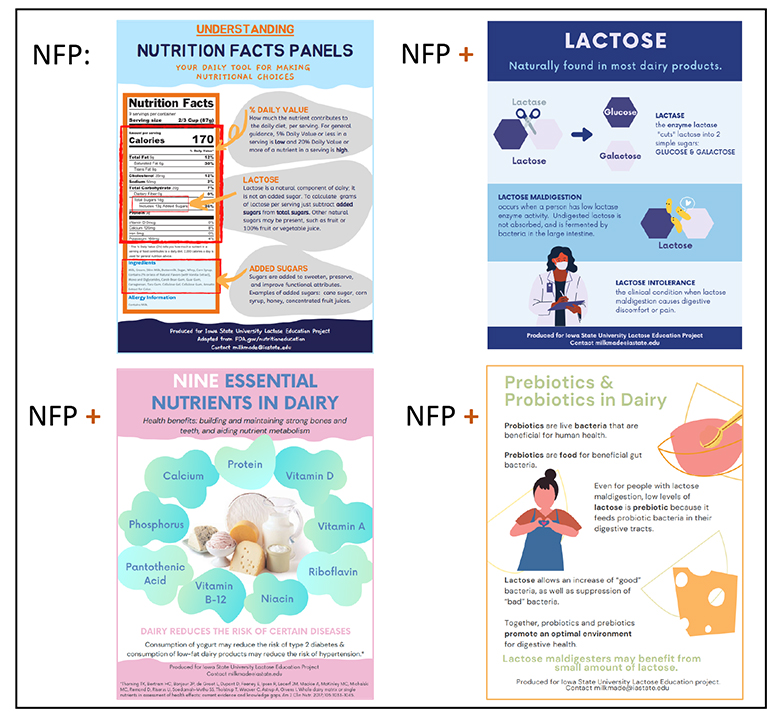Participants in a JDS Communications® study increased their purchasing and consumption of cheese, ice cream, milk, and yogurt by more than 20% after learning more about dairy nutrition
Philadelphia, February 27, 2024 – Although most Americans consume dairy and many dairy foods are rising in popularity, fluid milk consumption has seen a significant decline among US consumers since the 1960s. To reverse this trend—and ensure consumers are getting adequate amounts of dairy in their diets—the dairy sector has developed educational materials to reach consumers through informational infographics, TV and print ads, and on social media. But do these kinds of educational messages move the needle? A new study in JDS Communications demonstrates that when consumers are empowered with the facts on dairy’s nutritional benefits, they buy and consume more dairy products—including cheese, ice cream, yogurt, and especially milk.
Lead investigator Stephanie Clark, PhD, who recently retired from the Department of Food Science and Human Nutrition, Iowa State University, Ames, Iowa, explained, “We set out to educate those who consume an inadequate amount of dairy (less than 3 servings of dairy per day, according to The Dietary Guidelines for Americans) about various topics related to dairy nutrition, test their retention of information, and if increasing their knowledge around dairy motivates purchasing and consumption of dairy products.”
Clark and the research team conducted their study in 3 phases: a screening survey, a nominal focus group, and a final follow-up survey with voluntary adult participants. In the first phase, a total of 4,542 adults completed the team’s 15-question screening survey. “After the initial screening survey was closed, we funneled out a group of 195 participants for the nominal focus groups based on their interest in participating, lack of any food allergies, and the fact that they were reporting consuming less than three servings of dairy per day,” explained Clark. Four infographics were developed to help educate research participants about food labels and dairy concepts: nutrition facts panels, lactose maldigestion, 9 essential nutrients, as well as prebiotics and probiotics.
During the nominal focus groups phase, facilitators gave participants a pre-survey, then walked them through the infographic’s lesson, before administering an ice cream acceptability test. Three samples of ice cream were tasted, and the facilitators explained the nutrition facts panels and ingredient statements of each, with attention given to the differences in lactose and added sugar between the samples.
“Unlike traditional focus groups, where data are collected from interacting panelists,” explained Clark, “our goal with the nominal format—involving limited interactions between participants—was to deliver educational information to the participants efficiently.” After the ice cream test, participants received a post-survey, and another survey one month later.


Caption: Consumer education on reading nutrition labels, as well as the nutritional facts about dairy, led to a significant and positive effect on the overall amount of dairy in their diet, according to a new study in JDS Communications (Credit: Stephanie Clark and Jack Myers; iStock.com/skynesher)
The study results show that attending the nominal focus groups had a significant and positive effect on dairy product purchasing and consumption between the pre-survey and the one-month follow-up survey. “Average dairy product purchasing increased to 4.4 servings per week, a 26% increase. Average consumption of each dairy product also increased—23% for cheese, 20% for ice cream, 26% for yogurt, and a staggering 53% increase for milk.” In total, overall participant dairy consumption rose to 8 servings per week, or a 35% jump. “The result for milk consumption was the stand-out in our results,” said Clark, “with every focus group seeing milk consumption go up by at least one serving per week.”
Despite these positive results, the research team was quick to point out that participants did not reach the recommended 21 servings of dairy per week. They stressed the importance of additional research to understand the long-term impacts of education on dairy in the diet, or if improvements to the educational materials or delivery might enhance their impact.
Overall, this study demonstrates that carefully constructed educational messages on the benefits and nutritional attributes of dairy foods can positively influence consumer behavior, leading to increased purchasing and consumption of dairy foods.
Notes for editors
The article is “Dairy nutrition educational messages help increase dairy product knowledge, purchasing, and consumption,” by Jack Myers, Derek Schweiger, and Stephanie Clark (https://doi.org/10.3168/jdsc.2023-0417). It appears in JDS Communications, volume 5, issue 1 (January/February 2024), published by FASS and Elsevier.
The article is openly available at https://www.jdscommun.org/article/S2666-9102(23)00097-2/fulltext, and the PDF version is available at https://www.jdscommun.org/action/showPdf?pii=S2666-9102%2823%2900097-2.
Journalists wishing to interview the authors should contact the corresponding author, Stephanie Clark, PhD, formerly of the Department of Food Science and Human Nutrition, Iowa State University, Ames, Iowa, at milkmade@iastate.edu.
About JDS Communications
JDS Communications®, an official journal of the American Dairy Science Association®, is co-published by Elsevier and FASS Inc. for the American Dairy Science Association. The journal publishes narrowly focused, hypothesis-driven original research studies designed to answer a specific question on the production or processing of milk or milk products intended for human consumption. In addition to short research articles, JDS Communications publishes mini reviews—unsolicited, concise review papers. Research published in this journal is broadly divided into the production of milk from food animals (nutrition, physiology, health, genetics, and management) and processing of milk for human consumption (dairy foods). JDS Communications aims for rapid turnaround and a short time to publication. www.jdscommun.org
About the American Dairy Science Association (ADSA®)
The American Dairy Science Association (ADSA) is an international organization of educators, scientists, and industry representatives who are committed to advancing the dairy industry and keenly aware of the vital role the dairy sciences play in fulfilling the economic, nutritive, and health requirements of the world’s population. It provides leadership in scientific and technical support to sustain and grow the global dairy industry through generation, dissemination, and exchange of information and services. Together, ADSA members have discovered new methods and technologies that have revolutionized the dairy industry.www.adsa.org
About FASS Inc.
Since 1998, FASS has provided shared management services to not-for-profit scientific organizations. With combined membership rosters of more than 10,000 professionals in animal agriculture and other sciences, FASS offers clients services in accounting, membership management, convention and meeting planning, information technology, and scientific publication support. The FASS publications department provides journal management, peer-review support, copyediting, and composition for this journal; the staff includes several BELS-certified (www.bels.org) technical editors and experienced composition staff. www.fass.org
About Elsevier
As a global leader in information and analytics, Elsevier helps researchers and healthcare professionals advance science and improve health outcomes for the benefit of society. We do this by facilitating insights and critical decision-making for customers across the global research and health ecosystems.
In everything we publish, we uphold the highest standards of quality and integrity. We bring that same rigor to our information analytics solutions for researchers, academic leaders, funders, R&D-intensive corporations, doctors, and nurses.
Elsevier employs 9,000 people worldwide, including over 2,500 technologists. We have supported the work of our research and health partners for more than 140 years. Growing from our roots in publishing, we offer knowledge and valuable analytics that help our users make breakthroughs and drive societal progress. Digital solutions such as ScienceDirect, Scopus, SciVal, ClinicalKey and Sherpath support strategic research management, R&D performance, clinical decision support, and health education. Researchers and healthcare professionals rely on over 2,800 journals, including The Lancet and Cell; 46,000+ eBook titles; and iconic reference works, such as Gray’s Anatomy. With the Elsevier Foundation and our external Inclusion & Diversity Advisory Board, we work in partnership with diverse stakeholders to advance inclusion and diversity in science, research and healthcare in developing countries and around the world.
Elsevier is part of RELX, a global provider of information-based analytics and decision tools for professional and business customers.